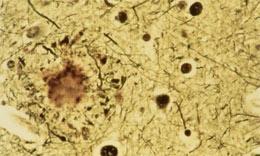
Protein plaques in the brain are characteristic of Alzheimer's... but are they a primary cause of the disease?
SCIENCE PHOTO LIBRARY
Posted on 02/09/2008 12:30:12 AM PST by neverdem
Mouse-brain study shows protein plaques to be a cause of the problem.
Protein plaques in the brain are characteristic of Alzheimer's... but are they a primary cause of the disease?
SCIENCE PHOTO LIBRARY
The brain protein plaques characteristic of Alzheimer’s disease can form extraordinarily fast, and seem to be the starting point of further degeneration in the brain — at least in mice.
The results, published today in Nature1, help to settle a long-standing debate about whether such plaques are a primary cause or a symptom of Alzheimer's, and may have implications for how the disease is treated.
"It’s a very exciting story," says Dennis Selkoe of Brigham and Women’s Hospital in Boston, Massachusetts, who has worked in the past with the research team involved. The chicken-and-egg question about which comes first — protein plaques or damaged brain cells — has been "argued about for decades", he says.
The argument has centred on clumps of a protein called amyloid-β that accumulate in the brains of patients with Alzheimer’s disease. These protein plaques are surrounded by abnormal neurons and immune cells called microglia.
Previous work in mice has suggested that amyloid plaques were critical to development of Alzheimer's disease, but researchers debated whether the plaques were a primary cause of the disease. It wasn’t clear whether the plaques recruited microglia, or if the microglia caused the plaques, says Selkoe.
Window of opportunity
To address this question, Bradley Hyman of Harvard Medical School in Boston, Massachusetts and his colleagues used mice engineered with mutation that cause amyloid plaque formation and neural disease. The researchers used cranial-window surgery to replace a piece of the skull with a tiny window that allowed them to monitor plaque development over time in live mice.
To their surprise, they found that plaques can arise within a single day, much faster than expected. “The plaques appeared very, very fast,” says Eliezer Masliah of the University of California, San Diego, who was not involved in the study. “People thought that it would take a matter of weeks or months.”
A few days after the plaques formed, microglia began to cluster around them. And over two weeks, projections from neighbouring neurons became progressively deformed. Masliah speculates that the plaques may exude amyloid fragments that can travel a short distance in the brain and damage neurons.
The timing of events strongly suggests that the amyloid plaques cause microglia accumulation, and not the other way around, says Selkoe. In fact, Hyman hypothesizes that rather than seeding amyloid plaques, the microglia could instead restrain their growth. “Once a plaque formed, it didn’t change in size,” he says. “This suggests that there is an active process that's limiting the growth.”
Fast action
Researchers are quick to caution that work done in mouse models may not directly apply to humans.
But if amyloid plaques do behave similarly in humans, their rapid growth could have implications for developing treatments, says Masliah. “It makes a point that one needs to have very effective compounds that will block the formation of plaques very early,” he says. Treatments will have to be either prophylactic or extremely fast-acting in order to have any effect. “The [plaques] form so fast that by the time we see a patient with clinical manifestations, they probably have many of these lesions forming.”
Several therapies that target amyloid plaques are already in development, including a phase III trial of a drug that inhibits an enzyme involved in amyloid production. Results from the trial are expected this summer, says Selkoe.
read
So by tomorrow midnight we could all have Alzheimer’s.
Disclaimer: Opinions posted on Free Republic are those of the individual posters and do not necessarily represent the opinion of Free Republic or its management. All materials posted herein are protected by copyright law and the exemption for fair use of copyrighted works.